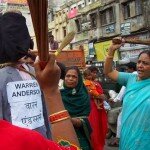By Rajeev Ravisankar, Kirwan Institute, Race-Talk contributor
A gas leak at a pesticide factory operated by Union Carbide Company (UCC) killed more than 20,000 people and exposed over 500,000 people to toxic gas and chemicals. On December 3, 1984 the people of Bhopal, India were subjected to one of the world's worst industrial disasters. As a result of this exposure, thousands of people were disabled. For years children have been born with birth defects.
As a result of this exposure, thousands of people were disabled. For years children have been born with birth defects. Currently, hundreds of tons of toxic waste remain at the site, and chemical processing not directly related to the disaster has contaminated the drinking water in the area. In the words of Indian writer and activist Praful Bidwai, � ���"The past 25 years in Bhopal make a story of death, disease and devastation, of injustice piled upon injustice, humiliation compounded by callousness, monumental corruption eating into miserable compensation, and of denial of rehabilitation.� �� �
Survivors continue to fight for justice and are fighting to hold accountable those who bear responsibility. One of those responsible is the CEO of Union Carbide at that time Warren Anderson, and Dow Chemical which now owns the company. This summer, an Indian court issued a warrant to arrest Mr. Anderson, and called for his extradition. He is now living luxuriously in the Hamptons.
One of the many painful lessons of this tragedy that is still playing out today is how a corporation, through a concerted public relations campaign and with deft legal maneuvering, can effectively deny culpability regardless of its devastating impact onhuman lives, the environment, and society. Never mind that Union Carbide ignored warnings of major hazards, cut costs, provided only limited emergency equipment, employed a flawed safety system in the Bhopal plant, and also disposed toxic waste into evaporation ponds.
Union Carbide sold its stake in its Indian subsidiary before being purchased by Dow Chemical. Dow in turn argues that it did not inherit any of Union Carbide's liabilities and points to the paltry compensation settlement with the Indian government. Explaining the company's position, Dow's public relations representative Kathy Hunt stated, � ���"You can't really do more than that, can you? $500 is plenty good for an Indian.� �� �
Such a statement is an articulation of a widespread � ��˜dominator mentality,' which favors individuals of certain nationalities, upper classes and castes, and values their lives over all others. It isn't shocking coming from a company that refuses to acknowledge any responsibility for supplying the incendiary weapon napalm and the poisonous defoliant Agent Orange to the US military during the war on Vietnam. Both of these have had horrifying human consequences, but these results are of little concern to Dow.
Despite this complete disregard for human life and the environment, Dow's interest in expanding its investments and operations in India raises no alarm due to the increasing nexus between government and corporations. The Indian state is willing to bend over backwards for multinational corporations and is more concerned about attracting foreign investment than protecting the rights of its own citizens. The notion of citizenship within a democracy has been completely turned on its head.
US business leaders, and so-called captains of Indian Industry like Ratan Tata, the head of India's largest conglomerate, have urged their respective governments to oppose efforts to extradite Warren Anderson or hold Dow accountable.
Top government officials listen, and some, shockingly, go the extra mile. For example, Minister of State for Environment Jairam Ramesh recently visited the disaster site and said � ���"I held the toxic waste in my hand. I am still alive and not coughing. It's 25 years after the gas tragedy. Let us move ahead.� �� �This coincides with plans to open the site to the public and promote some sort of disaster tourism.
According to Rachna Dhingra of the Bhopal Group for Information and Action, Indian Prime Minister Manmohan Singh responded to a question on Bhopal similarly, simply saying the country needs to move forward.
(Note: You can view every article as one long page if you sign up as an Advocate Member, or higher).





